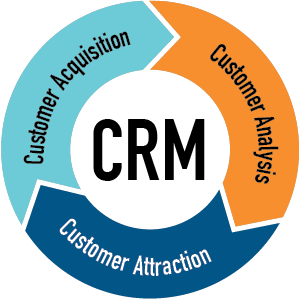Customer Relationship Management, or CRM, is a broad term that refers to the tools used to store detailed information about current and prospective customers to enable targeted communication with them. In today’s business world, the acronym commonly refers to the software system where that data is accumulated.
 For a history of the concept, it’s necessary to look back about 30 years when those at the forefront of emerging computer technology realized it would allow the collection of massive amounts of consumer data that could be used to customize marketing communications. One of the earliest software versions in the mid-1980s was called ACT! and was basically nothing more than a digital Rolodex. As the technology evolved, there were a number of fast-growing software companies working on upgrades that needed to be categorized.
For a history of the concept, it’s necessary to look back about 30 years when those at the forefront of emerging computer technology realized it would allow the collection of massive amounts of consumer data that could be used to customize marketing communications. One of the earliest software versions in the mid-1980s was called ACT! and was basically nothing more than a digital Rolodex. As the technology evolved, there were a number of fast-growing software companies working on upgrades that needed to be categorized.
New terms began to evolve to describe the market. Those included Enterprise Customer Management, Customer Interaction Software and CRM, with all of the terms basically meaning the same thing. There is wide debate over who actually came up with the term CRM, but it now describes the entire customer information gathering and marketing process.
In the farm equipment business, CRM is generally a facet of the business system. There are some dealers who rely on their OEM’s database to be their functioning CRM for marketing communications and a few dealers have stand-alone systems or separate CRMs that share information with their business system.
There are basically two ways to use CRM. Most dealers use it to store data about their current customers to prompt contact on a regular basis and to predict future sales opportunities. The challenge is to develop the second use — to gather contact information from walk-in traffic, emails, Internet traffic and customer phone calls and cultivate those relationships so they eventually fall into the first group of active customers.
With customers demanding that retailers target advertising relevant to their interests, CRM is a critical component of businesses moving into the digital future. Understanding and implementing CRM will enable progressive dealers to respond to the evolving sales environment.







Post a comment
Report Abusive Comment